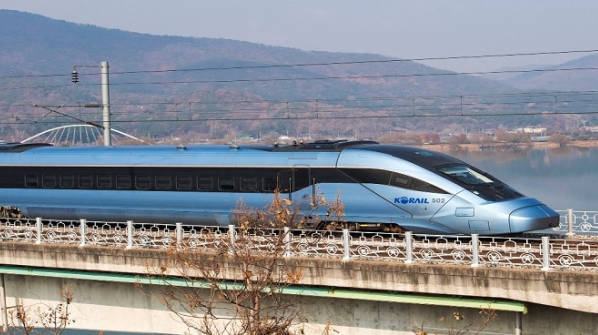Diesel trains will be replaced with fleets of 260km/h distributed-traction EMU-250 high-speed trains built by Hyundai Rotem. The high-speed EMUs, designated as KTX-Eum (KTX-Connect) by national operator Korail, are based on the HEMU-430X, a 430km/h prototype developed by Hyundai Rotem in 2012.
A fleet of five six-car EMU-250s began operation on the Seoul - Gyeongju Jungang line on January 5. The trains were supplied under a Won 216bn ($US 196.4m) contract for 84 EMU-250 sets awarded to Hyundai Rotem in December 2016. The remaining sets will be used to operate services on the Centre Island and Seohae lines.
A separate Won 102bn contract awarded in May 2016 for 30 sets to operate on the Gyeongjeon line is also currently being executed.
“We will replace all diesel passenger trains with the KTX-Eum by 2029 and establish eco-friendly railway transport nationwide,” Moon says. “By doing that, we will cut 70,000 tonnes of greenhouse gas emissions, which is equivalent to planting 10 million pine trees, and advance to a carbon neutral society.”
In addition to the recently opened section of the Jungang line from Wonju to Jecheon, Korail and the Korea Rail Network Authority (KRNA) is continuing to electrify sections of the network. This includes most sections of the Donghae Line on the east coast, to be completed by 2022, and parts of the Gyeongjeon Line between Gwangyang and Jinju, which is also due to be ready in 2022.
Hydrogen-powered trains also appear to be on the horizon as a future alternative to diesel. The Korean Rail Research Institute (KRRI) and Hyundai have agreed to exchange technologies while KRRI works on a hydrogen train propulsion system that can run up to 600km on a single charge at a maximum speed of 110km/h. The train is expected to be used on the line between Gangneung and Jejin on the border with North Korea.
Hyundai Rotem and the city of Ulsan have also signed an MoU to produce and test hydrogen-powered LRVs on a trial line in Ulsan’s port area.
In December 2020, Hyundai Rotem also opened a full-scale hydrogen extraction facility in the city of Uiwang to accelerate the development of its hydrogen economy infrastructure. The manufacturer said that it would localise production of parts, including catalytic agents, by March next year.
The Korean government announced the launch of its six-year, Won 114 trillion Green New Deal on July 14 2020. The investment plan is intended to curb the country’s reliance on fossil fuels and support the economy’s recovery post-Covid. Currently, coal makes up 40% of Korea’s electricity mix while renewable power accounts for less than 6%. However, the country now aims to be fully carbon neutral by 2050.

